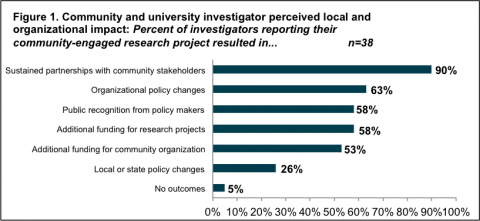CTSI has released a report that evaluates the Community Health Collaborative Grant award program, which aims to support research projects that lead to health improvements, while sustaining long-term partnerships between University of Minnesota researchers and community representatives.
This evaluation features input -- provided via a survey and interview -- from 23 of the 40 projects funded between 2010 and 2012.
CTSI will use these findings to optimize the way it supports future community-University research partnerships, with the goal of building healthier communities and adding value to the lives of Minnesotans.
Download a summary of the report
Key findings by category are as follows.
Building and sustaining community-University partnerships
- 90% of investigators reported their partnerships were new in that they had not previously collaborated on a research project. Many investigators had prior relationships in previous capacities, such as members of a work group or a task force.
- Just under half of investigators (48%) reported that community investigators initiated the partnership and project.
- Of those investigators interviewed, 65% reported continuing to work together either formally or informally at the time of this study’s data collection.
Integrating community expertise
- The majority of community investigators reported active engagement in the design (80%), implementation (89%), and dissemination research stages (83%). Fewer community investigators reported participating in the analysis (35%) and interpretation (41%) stages.
Investigator-perceived University and community outcomes
- More than half reported their project resulted in organizational policy changes (63%), public recognition (58%), and additional funding for research projects (58%) and community organizations (53%). See Figure 1.
- Investigators reporting organizational policy changes provided examples such as expanding or piloting the project or intervention within other organizations and clinical care practice changes. Examples of reported public recognition include replication of the intervention model, integration of findings into local government planning, and potential legislative policy changes.
